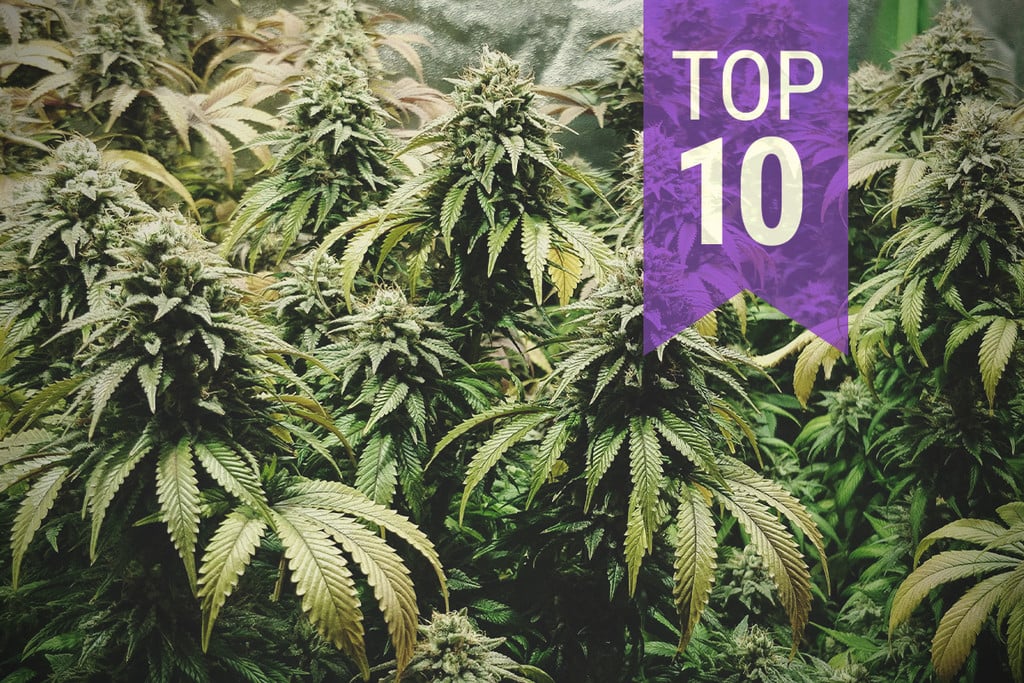.
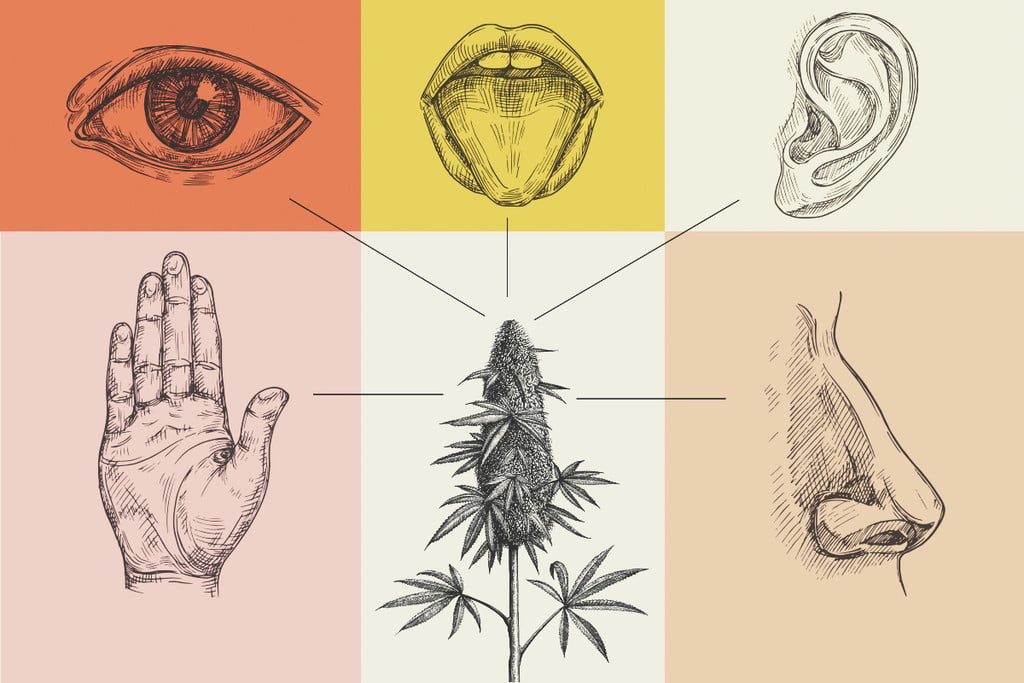
How Cannabis Affects the Five Senses
Does marijuana heighten the senses? It certainly makes food taste incredible and music sound divine. Interestingly, compounds from cannabis interact with receptors found close to or within all of our sensory organs. Below, we'll dive into the science that investigates how THC and other cannabinoids influence taste, sight, smell, touch, and hearing.
Contents:
If you’ve ever used cannabis, you’ll know just how profoundly it can influence the way we perceive the world around us. It only takes a few tokes for most people to begin detecting these changes. That song you’ve listened to hundreds of times suddenly has new depths, and a harmony you never paid much attention to before emerges to the fore. Cannabis also adds a sense of profundity to landscapes, sunsets, and forest settings, giving everything a shimmering, almost high-definition aesthetic (for some people, at least). Of course, we can’t speak of cannabis and the senses without touching upon taste. Not only does weed catalyse the munchies and frequent raids of the fridge, but it sends the taste buds into overdrive and makes the most mundane of snacks hit a whole lot differently.
So, how exactly does cannabis affect the human senses? Why does the herb influence the way we perceive sights, sounds, and tastes? Continue reading to learn the basics of the human senses, and the potential influence of the cannabis plant on each of them.
Importance of the Senses
Our senses allow us to experience the world around us; sense organs transmit signals from external sources and send them off through the nervous system into the brain. Here, our biological computer uses these signals to build a picture of our surroundings. Our senses help us to perform everyday tasks, from using a keyboard or stove top to driving and conversing with others. Fundamentally, our senses enable us to survive. Without them, we wouldn’t do a great job of detecting danger, procuring food, and reproducing.
Humans possess five primary senses in the form of taste, touch, hearing, sight, and smell. The sensory organs that correspond to each of these senses—e.g. our eyes enable us to see and our ears to hear—serve as vantage points into the outside world. Our brain sits bathed in cerebrospinal fluid safely in the cranium, and our sensory organs relay signals to our central nervous system and allow us to react and behave accordingly.
Each of our sensory organs possesses specialized cells that help to turn environmental signals into electrical information transmitted by the nervous system. For instance, as light enters the eyes and hits the retina, photoreceptors convert the light into electrical signals. When it comes to hearing, sound vibrates the cochlea and causes 25,000 nerve endings to transform the vibrations into electrical signals. Our skin also houses different cell types that detect different stimuli; mechanoreceptors respond to mechanical stimuli, thermoreceptors respond to temperature, and chemoreceptors to chemicals.
Our senses work independently or in concert to inform us of threats and sources of reward. Certain inputs, such as loud, sudden noises or foul tastes, trigger automatic responses that protect us from potential danger. However, inputs such as the warm touch of another, or tastes of sweetness, elicit feelings of pleasure.
How Cannabis Interacts With the Body
Compounds within cannabis interact with the body in an incredibly broad yet specific way. Through the endocannabinoid system (ECS), cannabinoids such as THC and CBD are able to change cellular activity by binding directly to receptors or altering enzyme function. The ECS “oversees” essentially every other system in the human body, from the nervous system to the musculoskeletal system, and helps to keep these areas in a state of balance—known as homeostasis.
Endogenous cannabinoids created by the body (known as endocannabinoids) play the role of signalling molecules (neurotransmitters) within the ECS. However, external cannabinoids share a similar structure to such compounds, which enables them to work in a similar, even more profound, fashion.
Components of the ECS are particularly abundant in the central nervous system, where they help to control neurotransmitter flow, mood, appetite, and memory. As a ubiquitous part of our biological computer, the ECS also plays a role in regulating sensory processing[1] in areas including the olfactory and visual systems. Outside of the brain, the ECS is also embedded within our sensory organs. It shows up in the retina of the eyes, cochlear nucleus of the ear[2], and taste receptors of the tongue[3].
Given that the ECS plays an important role in the way we perceive the world, and that cannabinoids from the cannabis plant are able to modulate this system, it becomes ever-more intriguing to investigate the effects of cannabis and its constituents on specific senses, and the implications of such outcomes.
How Cannabis Affects the Senses
So, how exactly does cannabis influence our senses? And what happens on the physiological level to make this possible?
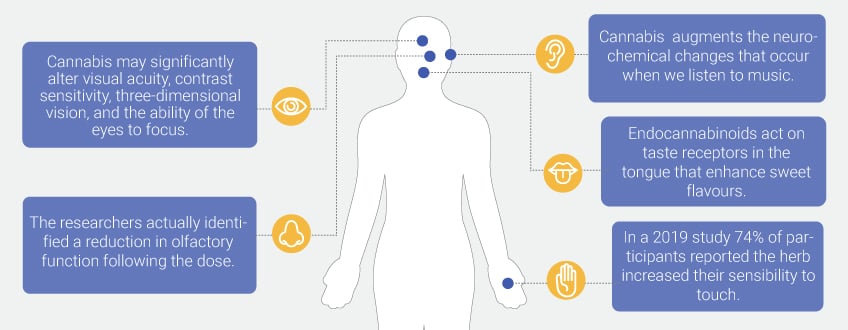
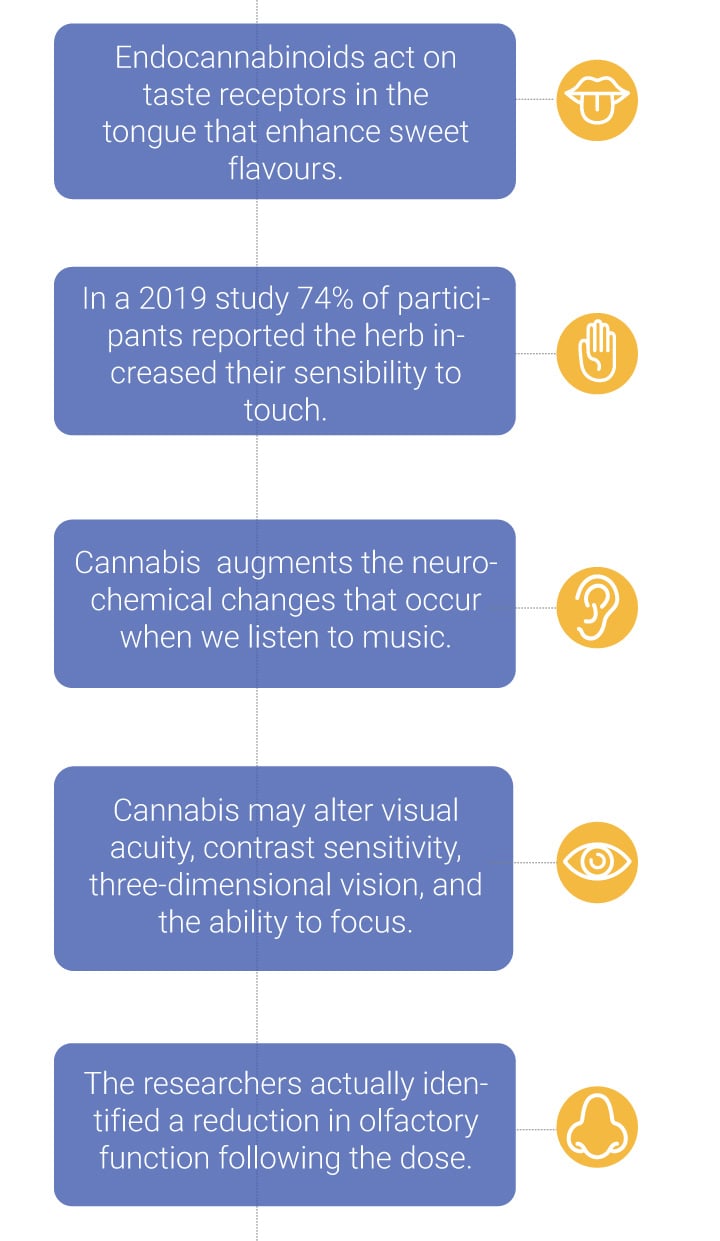
Taste
Most cannabis users would agree that the herb makes food taste better. It brings the flavors of sweet dishes to new heights and adds an edge to the most basic of snacks; even bread and butter proves moreish enough to satisfy the munchies when high. Sure, THC has a tendency to induce the munchies, but the enhanced taste doesn’t stem from hunger alone. Back in 2009, researchers from the Monell Chemical Senses Center in Japan found endocannabinoids to act directly on taste receptors in the tongue in a way that enhances sweet flavors[4]. Interestingly, the team found that the administration of endocannabinoids had no impact on the perception of other tastes, such as sour, salty, bitter, and umami.

Touch
As mechanoreceptors, Merkel cells play a key role when it comes to the sensation of touch. More specifically, these cells are essential to the sensation of light touch, and convert external stimuli into electrical signals that are then transmitted by neurons in the skin. Research remains scant on the relationship between the ECS, Merkel cells, and touch—but the system is certainly present within the skin.
Very few studies have examined how cannabinoids influence the sensation of touch. So far, we only have subjective data on the topic. A 2019 study published in the Journal of Sexual Medicine designed a survey to collect data on how cannabis alters the sexual experience in both men and women. A total of 144 of the 199 participants (74%) reported that the herb increased their sensitivity to touch.

Hearing
Few cannabis users will deny that music sounds better when high. But have you ever experienced heightened hearing when stoned? The plant seems to help listeners pick up on small details in a track, and everything seems more vibrant and significant. However, musical enjoyment when smoking weed appears to depend, at least in part, on cannabinoid concentration. Researchers from University College in London found high-THC cannabis to dampen the effect of music in brain regions associated with reward and emotion. However, bringing CBD into the equation offset these effects—a testimony to the entourage effect.
Rather than changing the way we detect sound within the ear, cannabis likely augments the neurochemical changes that occur when we listen to music. Music that we like leads to an increase in dopamine[5]; so does smoking cannabis[6].
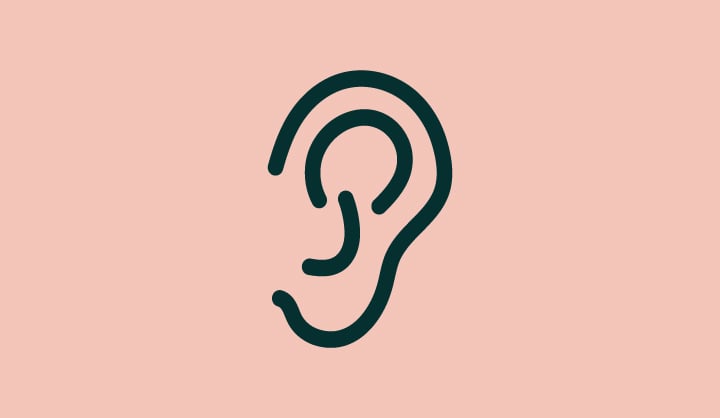
Sight
The science surrounding the impact of cannabis on vision remains early and inconclusive, especially compared to taste. A case study performed back in 2004, published in the Journal of Ethnopharmacology, suggests that cannabis consumption could help to improve night vision[7]. However, more scientifically robust[8] findings obtained by researchers at the University of Granada show that cannabis may significantly alter visual acuity, contrast sensitivity, three-dimensional vision, and the ability of the eyes to focus.

Smell
Have you ever noticed any difference in your sense of smell after smoking a joint or hitting a bong? The research remains inconclusive here too, and the results vary between animal and human subjects. Animal studies have shown that cannabis administration could boost odour detection[9] and subsequently increase food intake. However, human trials tell a different story. A study published in the British Journal of Clinical Pharmacology administered 20mg of oral THC to fifteen healthy volunteers. The researchers actually identified a reduction in olfactory[10] function following the dose.


Does Weed Heighten Your Senses?
Cannabis certainly appears to increase our appreciation of sweet foods and help us become more perceptive to the music that we love (when there’s enough CBD involved). However, the available science shows us that the herb might actually reduce both visual and olfactory acuity, at least in the short term. Plus, the research remains far too early to draw conclusions about the effects of cannabis on the sense of touch. Overall, cannabis won’t supercharge all of your senses. However, it can certainly help you enjoy all that your favorite foods and songs have to offer.
- Frontiers | Cannabinoids Regulate Sensory Processing in Early Olfactory and Visual Neural Circuits | Frontiers in Neural Circuits https://www.frontiersin.org
- The Endocannabinoid System in the Cochlear Nucleus and Its Implications for Tinnitus Treatment | SpringerLink https://link.springer.com
- Endocannabinoids act directly on tongue taste receptors https://www.sciencedaily.com
- https://www.sciencedaily.com
- Dopamine modulates the reward experiences elicited by music https://www.pnas.org
- The effects of Δ9-tetrahydrocannabinol on the dopamine system - PMC https://www.ncbi.nlm.nih.gov
- Cannabis improves night vision: a case study of dark adaptometry and scotopic sensitivity in kif smokers of the Rif mountains of northern Morocco - PubMed https://pubmed.ncbi.nlm.nih.gov
- Smoking cannabis significantly impairs vision | EurekAlert! https://www.eurekalert.org
- Cannabinoid-Related Olfactory Neuroscience in Mice and Humans | Chemical Senses | Oxford Academic https://academic.oup.com
- Effects of 20 mg oral Δ9-tetrahydrocannabinol on the olfactory function of healthy volunteers - PMC https://www.ncbi.nlm.nih.gov




























